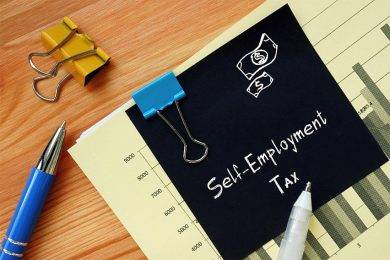Starting your own business has a lot of perks, one of which is getting some great tax breaks. The IRS allows self-employed individuals to deduct a variety of business-related expenses come tax time. Keep reading to learn more about the tax breaks you may be eligible for as a self-employed individual.
Filing Taxes as a Self-Employed Individual

When you’re self-employed, there are a few tax breaks that can help reduce your taxable income, but there are also a few things to keep in mind when planning to file your taxes as a self-employed person. The most important thing you can do is to stay organized throughout the year, keeping your receipts, invoices, and other important tax forms and documents in designated tax return folders. This will help you ensure that your information remains easily accessible when you need it most.
First, you’ll need to file Schedule C with your 1040 tax return. This form is used to report income and expenses associated with your business. You can deduct any legitimate business expenses from your income on this form, which will lower your taxable income. We’ll explore business expenses in more detail later.
You may also be able to claim the self-employment tax deduction. This deduction allows you to deduct half of the Social Security and Medicare taxes you pay on your business income and can save you a significant amount of money on your taxes.
Deductible Business Expenses
There are a few tax breaks specifically for the self-employed. Perhaps the most significant is the ability to deduct business expenses from your income, which can reduce your tax bill. To qualify for this deduction, your expenses must be ordinary and necessary. This means that they must be common and helpful in running your business. They must also be reasonable in amount. Some common examples of deductible expenses include advertising and marketing expenses, automobile expenses, home office expenses, and meals and entertainment expenses.
Advertising and marketing expenses are those costs incurred to promote or sell a product or service. This could include things such as paying for advertising space in a newspaper or magazine, purchasing billboard space, or hiring a public relations firm.
Meals and entertainment expenses are those costs incurred when eating out or entertaining clients and prospects away from your place of business. These types of expenditures can be deducted as long as they are considered ordinary and necessary for conducting business affairs. The 50-percent deduction limit still applies even if you are self-employed.
Home Office and Automobile Deductions

Automobile expenses are those costs related to using a car for business purposes. This could include gas, repairs, depreciation, lease payments, and parking fees. Self-employed individuals can deduct these costs either by tracking actual miles driven for work purposes or by using a standard mileage rate set by the IRS each year.
Home office expenses are those costs associated with having an office in your home that is used exclusively for business purposes. This could include rent or mortgage payments, utilities, insurance premiums, repairs, and furniture purchases. Home office deductions can be taken whether you use part or all of your home for business purposes.
If you are using a single room or area for your business, many self-filing tax return applications have made it easier than ever to calculate the percentage of your rent, utilities, and related home office costs that qualify for deductions.
Overall, these tax breaks are important because they help to reduce the amount of taxes that self-employed individuals have to pay during tax season. This can help to make it easier for self-employed individuals to manage their finances and keep their businesses running.
Alton Clarke was born and raised in Syracuse. He has written for MSNBC, The Business Insider and Passport Magazine. In regards to academics, Alton earned a degree from St. John’s University. Alton covers entertainment and culture stories here at Diving daily.











